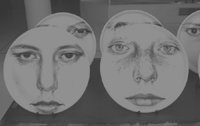

Agnete asks Hans for directions to the mermaid.
Hans: You want to go where?
Agnete: There is a statue in the town. I have heard it is famous.
Hans: There are many statues in the town.
Agnete: But this one is special. It is of a merperson.
Hans: The little mermaid? It is, shall we say, unprepossessing.
Agnete: I know, but its story is tragic. Oh so, tragic. She cuts out her tongue, pain in her legs is like knives when she dances, the prince does not marry her.
Hans: What kind of a man could inflict such pain, even on a fictional merperson? Are you sure you still want to go?
Agnete: But the ending is happy. She doesn’t kill the prince, becomes a spirit who does good deeds and goes to heaven.
Hans: It doesn’t sound a likely ending.
__________
Of course, this is not the original Hans Christian Andersen. But through these costumed guides the past replays itself, and with each replay, the past is a little differently interpreted. Can oral history be entirely relied upon? How deeply in the myth is the real event buried?
...
Voiceover
Of course, this is not the original Hans Christian Andersen. But through these costumed guides the past replays itself, and with each replay, the past is a little differently interpreted. Can oral history be entirely relied upon? How deeply in the myth is the real event buried?
...












No comments:
Post a Comment